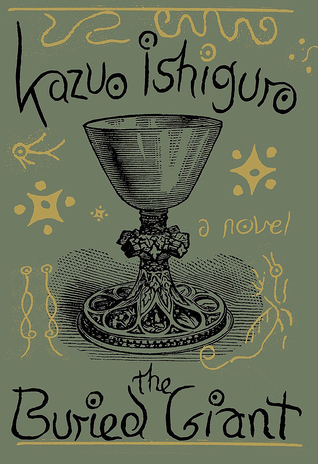- The Good: Exploration of memory and it’s affect on love and war
- The Bad: Flat characters; slow pacing; purposefully simplistic prose
- The Literary: King Arthur and Tolkien fit within this historical fantasy
Axl and Beatrice, an elderly married couple, set off on journey to visit a son they haven’t seen in years. They only just remembered they had a son, because a cold mist permeates the land that causes memory loss. Their quest takes place in a post-Arthurian Britannia where Saxons and Britons live uneasily side by side.
I love books about memory, themes of loss, and literary fantasy, and this book won the World Fantasy Award for Best Novel and is included in Time Magazine’s 100 Best Fantasy Books of all Time. It’s extremely literary, meaning the author’s first goal is to create an art form with words by doing something new. In several ways Ishiguro accomplishes this.
First, the themes of memory loss are central and play out in a micro and macro story. The married couple, Axl and Beatrice know they love each other and have for a long time. It’s not until they hear a story that they will have to share their most beloved memories of one another to be able to enter the afterlife together that they realize their treasured life has been stolen away. But during their search, and as memories slowly reveal themselves, they each wonder if ignorance is better, knowing that some transgressions must have taken place.
The uneasy alliance between the Britons and the Saxons is central to the worldbuilding. They live in neighboring villages and speak different languages and tolerate each other. Because of the mist, they cannot remember why they once fought one another, and long lost grievances are forgotten.
Reflecting the themes of the novel, Britain in the early Saxon era is a period steeped in legend but ultimately one about which we remember very little, also known as the Dark Ages. The setting and ultimately the title reflect something grand that’s been with us all along, just beneath the surface. Even the terrain the journey explores, from underground valley homes to mountaintops represent a transition from low to high visibility, as well as knowledge.
Unfortunately, all the good ideas, references, and thematic elements come together into a simplistic, poorly paced story with little stakes and underdeveloped characters, all with stilted prose. The perspective shifts don’t make it any easier.
The original Arthurian legends are stories with purpose, morality tales about honor and loyalty. But aside from an elderly Gawain who meets Axl and Beatrice on their journey, a reference or two to Arthur and Merlin, the novel could exist entirely without this angle. Why center a story in this lore if the best parts of it are not included?
The book falls into the category of fantasy, with ogres, pixies, and dragons, but they are neither exciting nor interesting. They are barely described and don’t represent the dark side of humanity or worldly dangers. They are just part of a few disconnected plot points. Speaking of plot, fantasy is known as a plot heavy genre, with the hero’s journey as a tried and true skeleton, nearly perfected by Tolkien, but completely missed here.
Lastly, there are so many dropped plot points and unintended Chekov’s guns, that I am left feeling completely unsatisfied. The art of writing an engaging novel seems to have taken a backseat to a more literary, even postmodern take on the concept of memory with a British twist.
Not recommended for a wide audience, but if you are in the mood for a concept novel, something to ponder on more than enjoy, this may be right for you.
